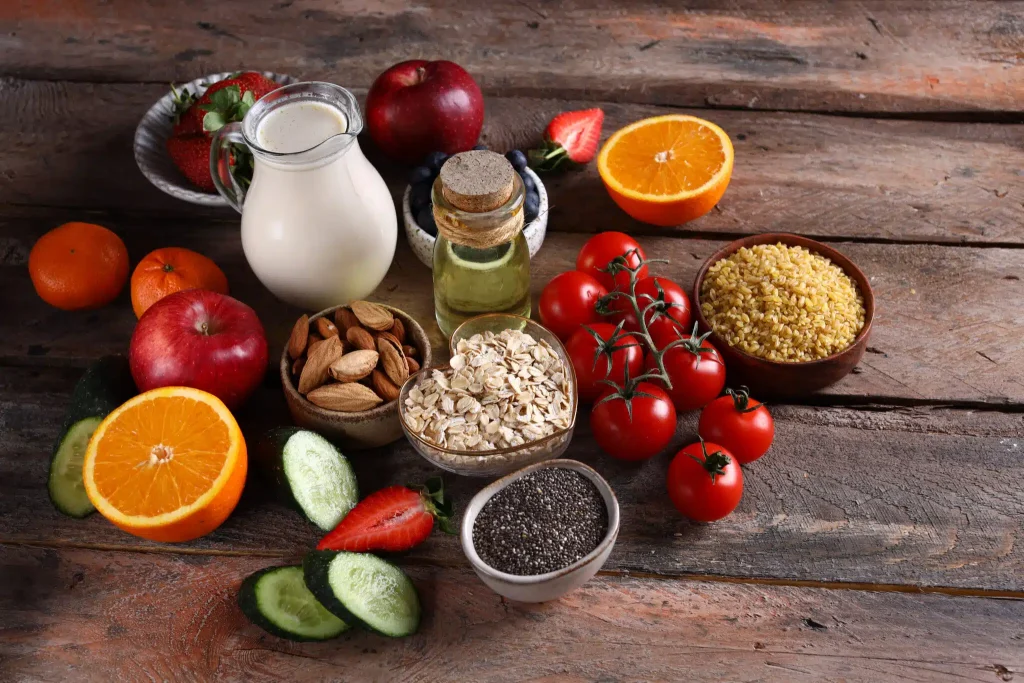Vegetables and Fruit
Vegetables can be used as pureed soups, veloutés, or hearty soups combined with cereals or legumes, which we will mention later. Among the winter vegetables to choose from are those belonging to the cruciferous family: BROCCOLI, CABBAGE, CAULIFLOWER, and BRUSSELS SPROUTS. These provide numerous benefits, especially for intestinal health, supporting motility and balance, and are therefore fundamental for cancer and cardiovascular prevention. They are also rich in vitamins, primarily Vitamin A, Vitamin C, and Beta-Carotene—essential for vision and skin health. In addition, their high calcium content (the richest plant-based source) makes them excellent for bone health prevention. As for fruit, in-season options include ORANGES and MANDARINS, which are rich in Vitamin C. They are great as snacks or at breakfast. For those who don’t drink much water, consuming them as fresh juice is a good way to increase daily fluid intake.Cereals
Even cereals, though pasta and rice are cultural staples year-round, have seasonal variations worth following to improve balance and variety in the diet. The main winter cereals are: BARLEY, SPELT, and BLACK RICE. These can be used combined with vegetables and proteins or as soups together with legumes and vegetables. BARLEY is rich in nutrients and fiber, with a mild laxative effect that supports intestinal motility and regulates the body. SPELT offers similar benefits, with high fiber content and great satiety power, making it useful in calorie-restricted diets. Finally, BLACK RICE or VENERE RICE, as whole-grain varieties, provide more fiber, antioxidants, and minerals, making them excellent winter cereals for seasonal illness prevention. They also contain higher levels of protein, especially lysine—an amino acid less present in other cereals.Legumes
Legumes can be included in all seasons, but they are most often consumed in colder months. The legumes to favor in winter are: LENTILS and CHICKPEAS. They can be paired as a side dish with a protein source or as a complete meal combined with cereals.
LENTILS are certainly well-known for New Year’s celebrations, but beyond the traditional belief that they bring “wealth” to those who eat them, they are in fact an excellent plant-based protein source (10 g/100 g), as well as a good supply of carbohydrates and fiber, combined with vitamins (Vitamin B3) and antioxidant minerals, including isoflavones.
CHICKPEAS are also an excellent legume to include in a winter diet thanks to their satiating and nutritious properties as a source of carbohydrates and proteins. They support intestinal health and help prevent cardiovascular diseases, in addition to providing minerals and B-group vitamins. Besides being used in soups or as side dishes, they are often recommended as creamy soups or as hummus—a very tasty and enjoyable recipe.
Meat
For meat lovers, winter is certainly the favorite season, as consumption generally increases. In addition to the main cuts of meat, the winter season is well known for the consumption of GAME such as DEER, WILD BOAR, and ROE DEER. Game meat is an excellent protein source (>22% protein per 100 g) and low in cholesterol and saturated fats, unlike traditional meat. It has a high content of vitamins, especially B-group vitamins, since it undergoes less processing compared to conventional meat. While it is not a food to be consumed frequently or in large amounts, for healthy individuals (it is strongly discouraged for those with hyperglycemia), it can be a tasty and nutritious alternative—always paired with the right portion of vegetables in a balanced diet. In Ticino, for instance, ROE DEER SADDLE is particularly popular!Dessert
Among desserts, a classic choice is HOT CHOCOLATE. This typical winter treat is perfect after a cold day outdoors. The benefits of hot chocolate are the same as those of dark chocolate, and of course, the higher the cocoa percentage (ideally above 80%), the greater the antioxidant benefits from the flavonoids contained in cocoa. In fact, hot chocolate helps reduce blood pressure and improves cardiovascular health. Moreover, it delights the mind after a stressful, cold workday, making it an excellent little treat to enjoy at the end of the day.
Solution for Building Better Habits and a Balanced Diet
First of all, I need to set intermediate and achievable goals in order to monitor my progress and keep my motivation high—both thanks to the goals already achieved, which give me value, and those not yet reached, which push me to do better.
Of course, doing it alone is more complex and difficult. Planning a personalized program with one or more professionals will make everything easier.
A nutritional program should be planned gradually, aiming to change poor habits with achievable goals over the weeks and, above all, giving yourself time to reach the result.
Relying on nutrition professionals is certainly a key step in creating the right plan tailored to my needs and habits. Combining physical activity with another health professional and motivational coaching support can be an extra step that helps me achieve results while maintaining high motivation and focus on the goal.
This type of approach is offered at our Polispecialistico Paradiso center through the LIFESTYLE PROGRAM, a 6-MONTH program in which you will be followed nutritionally by a Nutritionist who will set a dietary strategy and continuous goals based on your habits and lifestyle to improve your diet. You will also be supported by a Personal Trainer in a Pilates program, and by a Wellness Coach who will continuously work on your motivation to help you achieve your set goal.


